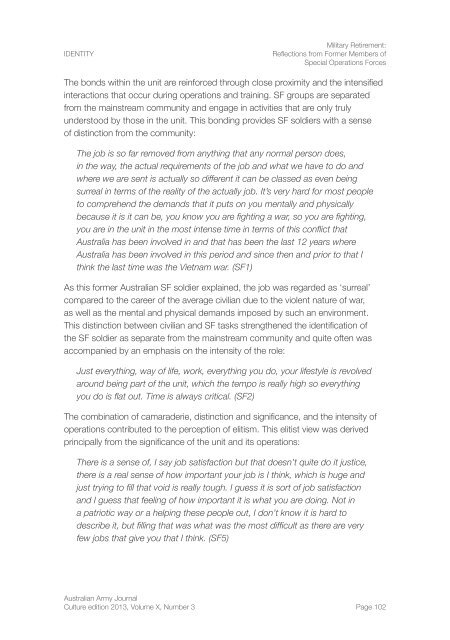Australian Army Journal
Australian Army Journal
Australian Army Journal
Create successful ePaper yourself
Turn your PDF publications into a flip-book with our unique Google optimized e-Paper software.
IDENTITY<br />
Military Retirement:<br />
Reflections from Former Members of<br />
Special Operations Forces<br />
The bonds within the unit are reinforced through close proximity and the intensified<br />
interactions that occur during operations and training. SF groups are separated<br />
from the mainstream community and engage in activities that are only truly<br />
understood by those in the unit. This bonding provides SF soldiers with a sense<br />
of distinction from the community:<br />
The job is so far removed from anything that any normal person does,<br />
in the way, the actual requirements of the job and what we have to do and<br />
where we are sent is actually so different it can be classed as even being<br />
surreal in terms of the reality of the actually job. It’s very hard for most people<br />
to comprehend the demands that it puts on you mentally and physically<br />
because it is it can be, you know you are fighting a war, so you are fighting,<br />
you are in the unit in the most intense time in terms of this conflict that<br />
Australia has been involved in and that has been the last 12 years where<br />
Australia has been involved in this period and since then and prior to that I<br />
think the last time was the Vietnam war. (SF1)<br />
As this former <strong>Australian</strong> SF soldier explained, the job was regarded as ‘surreal’<br />
compared to the career of the average civilian due to the violent nature of war,<br />
as well as the mental and physical demands imposed by such an environment.<br />
This distinction between civilian and SF tasks strengthened the identification of<br />
the SF soldier as separate from the mainstream community and quite often was<br />
accompanied by an emphasis on the intensity of the role:<br />
Just everything, way of life, work, everything you do, your lifestyle is revolved<br />
around being part of the unit, which the tempo is really high so everything<br />
you do is flat out. Time is always critical. (SF2)<br />
The combination of camaraderie, distinction and significance, and the intensity of<br />
operations contributed to the perception of elitism. This elitist view was derived<br />
principally from the significance of the unit and its operations:<br />
There is a sense of, I say job satisfaction but that doesn’t quite do it justice,<br />
there is a real sense of how important your job is I think, which is huge and<br />
just trying to fill that void is really tough. I guess it is sort of job satisfaction<br />
and I guess that feeling of how important it is what you are doing. Not in<br />
a patriotic way or a helping these people out, I don’t know it is hard to<br />
describe it, but filling that was what was the most difficult as there are very<br />
few jobs that give you that I think. (SF5)<br />
<strong>Australian</strong> <strong>Army</strong> <strong>Journal</strong><br />
Culture edition 2013, Volume X, Number 3 Page 102

















